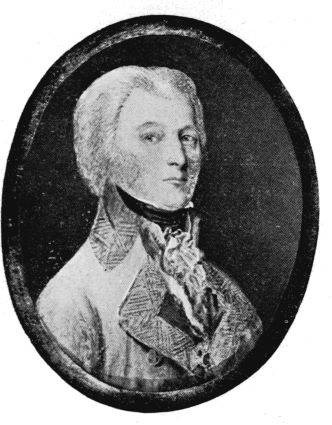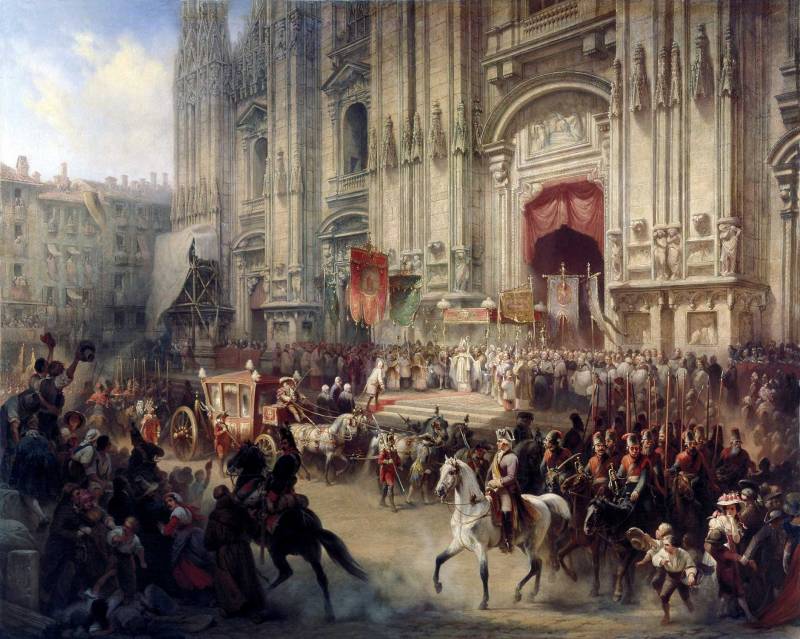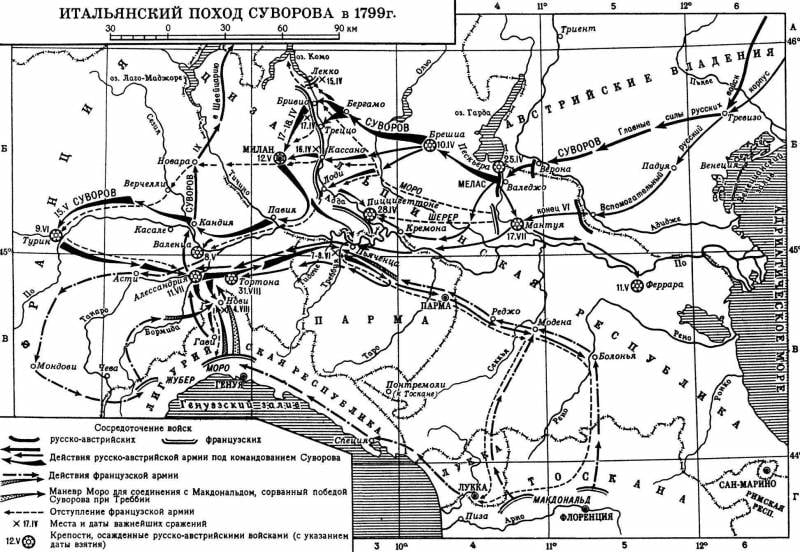Italian campaign of Suvorov
At the beginning of 1799, the overall military-strategic situation for the Allies in Europe was unfavorable. The Austrian army was driven out of Switzerland and Northern Italy. French troops threatened Vienna itself. In London and Vienna, fearing that their generals are not capable of crushing talented French commanders, they asked that A.V. Suvorov be put in charge of the Russian troops aimed at helping the Austrians.
At this time, the great Russian commander was in disgrace in his estate in the village of Konchansky (Novgorod province). He has been there since February 1797 and spent two years. She was associated with the military reforms of Paul I. It was the sovereign's reaction to the transformations of Catherine II, the “Potemkin order” he hated. Paul wanted to bring order and discipline in the army, guards, officers and nobility. However, rejecting the previous order, which became, as military historian A. Kersnovsky noted, “a natural and brilliant stage in the development of the Russian national military doctrine,” Paul filled the void with Prussian forms. And the Prussian army was hired-recruiting, where soldiers were “brought up” by gauntlets (a long, flexible and thick rod for corporal punishment) and with sticks. In the Prussian army, individuality and initiative were suppressed, automatism and linear battle formation were developed. Rumyantsev and Suvorov, however, gave the country a system that allowed them to beat the most powerful enemy, was Russian.
Suvorov didn’t keep silent: “Powder is not powder, it’s not guns, scythes are not hatchets, we are not Germans, but hares”! Alexander Vasilievich did not put the Prussian orders and their military doctrine for nothing: “There is no lousy Prussians ...”. As a result, fell into disgrace. Thus, on the one hand, Paul I pulled up a brilliant, but full-blown army, especially the guard. Dandies and idlers, who looked for military service, as an opportunity to make a career, get orders, awards, while neglecting their direct duties, made them feel that service is service. Pavel paid much attention to the soldiers, they loved him: they greatly improved their way of life, built barracks; voluntary work in favor of the noble officers, who looked at the soldiers as serfs, his servants, were prohibited; soldiers began to receive orders, collective distinctions were introduced — for the regiments, etc. On the other hand, Pavel violated the Russian military tradition, coming from Rumyantsev, Potemkin and Suvorov. The army was sent to the path of blind imitation of Western European models. Again began the blind imitation of foreigners. After that, for a whole century, the Russian military school was under pressure from foreign, mainly German, doctrines.
Observing from the estate the course of the war, Suvorov sharply criticized the cordon strategy of the Austrian military-political leadership. Back in 1797, the Russian commander wrote to Razumovsky in Vienna: “Bonaparte concentrates. Gough-kriegs-recht (gofkrygsrat - court military council in Austria. - Author.) Wisely covers it from the pole to the equator. The glorious does the crushing, weakening the mass. " In 1798, Suvorov formulated a plan to fight France: only an offensive; rapidity; no methodicalness, with a good eye meter; full power to the general anshefu; attack and beat the enemy in the open field, do not waste time on the siege; never disperse the strength to save any items; for victory in the war - a trip to Paris (they were able to organize a trip to Paris only in 1814). This was a new doctrine for that time: the concentration of forces for the main attack, the mobility of the army, the defeat in the decisive battle of the main forces of the enemy, which leads to victory in the campaign. It should be noted that Napoleon Bonaparte, in his campaign, acted quite in Suvorov and beat enemies who had become rigid in linear order.
In February 1799, Suvorov was returned to service and appointed commander-in-chief of Russian troops in Northern Italy. Alexander Vasilyevich demanded complete freedom in the choice and means and methods of war. “Lead the war,” the Russian sovereign Pavel told him, “in his own way, as you can.” Suvorov repeated the same requirements to the Austrians. With Suvorov, the 65-thousandth Russian army was planned to move to Italy. Another 85 thousand soldiers, located in the west of the country, were brought to combat readiness. 1-th echelon of Russian troops - 22-thousand. Corps of General Rosenberg, made from Brest-Litovsk in October 1798 year and in early January 1799 year reached the Danube, where he stood on apartments in the vicinity of Krems and St. Pölten.
14 (25) March 1799, Count Suvorov-Rymniksky arrived in Vienna. They tried to impose on him the Austrian military-strategic plan, which was to ensure the defense of the borders of Austria. Suvorov was given a war plan approved by the emperor Franz. The plan as a whole was defensive, passive. The limit for the actions of the Allied Army was to put troops on the line of the Adda River and capture the fortress of Mantua. Suvorov had to coordinate his actions with Vienna. The Austrians wanted to deprive the Russian commander of independence. The Austrian army submitted to him only partially. In the hands of General Melas (his 85-thousand army was in Italy) was supply, and he had broad rights under the command of the Austrian troops. In fact, unity of command was not. Count Rymniksky ordered the Austrian soldiers on the battlefield, while the distribution of forces in the theater of military operations was managed by the gofkryssrat. Later, the Austrian high command began to interfere in the course of military operations and even cancel some orders of Suvorov, if they contradicted the Austrian plans.
Field Marshal Suvorov planned a decisive offensive in northern Italy to occupy Lombardy and Piedmont, and then go to Paris via Lyon. Alexander Vasilievich was going to defeat two French armies (Italian and Neapolitan) separately, to liberate all of Italy from the French. Then Northern Italy became a strategic bridgehead for the transfer of hostilities to France. At the same time, he was going to defeat the main forces of the French army in the field and not spend time and energy on the siege of fortresses. The main blow to France was delivered through northern Italy, the auxiliary blows through Switzerland, southern Germany and Belgium. Great importance was also attached to the actions of the Allied fleet in the Mediterranean Sea, Ushakov’s squadron.
To increase the combat capability of the Austrian army, Suvorov-Rymniksky sent Russian officers to it as instructors and prepared a special instruction in combat training (based on the "Science of Victory"). The main task of the Russian officers, among whom was Bagration, was to teach the Austrians the basics of the tactics of the columns and the loose order, the bayonet battle, to develop initiative and independence in them.
The forces of the parties
Northern Italy was occupied by the French army under the leadership of Scherer (then replaced by Moreau) - 58 thousands of soldiers, half of his troops were scattered in garrisons in the fortresses. In Southern Italy, the second French army (Neapolitan) was under the command of MacDonald - 34 thousand people. About 25 thousand soldiers were garrisons in various points and cities of Lombardy, Piedmont and the Genoese region.
The 57 thousandth Austrian army (of which 10 thousand cavalry) under the temporary command of General Kray (in the absence of Melas) stood on the Adige River. In reserve, the Austrians had two divisions (25 thousand people) - the troops were located in the area of the rivers Piave and Isonzo. The main rear base of the Austrian army was in Venice. Vienna ordered Krai to act in the direction of Brescia and Bergamo, and to detach a part of the troops to the north in order to force the French to clear the Tyrol region.
The Russian army consisted of two corps: Rosenberg and Rebinder. The corps of Rosenberg consisted of an avant-garde under the command of Prince Bagration, two divisions of Poval-Shveikovsky and Ferster, 6 of the Don Cossack regiments, and an artillery battalion. The Rebinder corps had one division, two companies of field artillery, a company of horse artillery, two Don Cossack regiments. The total number of Russian troops reached 32 thousand people. The morale of the Russian army, after the victories over Turkey, Sweden and Poland, was extremely high. In addition, the Russian warriors were led by an invincible and beloved leader and soldier and officer.

Austrian commander Paul Krai von Craiow und Topola
Unsuccessful attack of the army of Scherer
To preempt the arrival of Russian troops to help the Austrians, the Directory (French government) ordered Scherer to launch an offensive, force the r. Adige in the region of Verona and push aside the enemy for Brent and Piave. In March, 1799, the French troops forced the river. Mincio. General Scherer believed that the main forces of the Austrian army are located on the left flank, between Verona and Gard lake. He planned to first develop the enemy, and then cross the Adige. As a result, he dispersed his forces: directed the division of Montrichard to Legnago, moved Moreau with two divisions against Verona; and with three divisions he marched against the fortified camp at Pastrengo. For its part, Krai, believing that the main forces of Scherer would head for Verona, gathered the bulk of his troops towards the center and his left flank.
As a result, the French troops were dispersed, had a bad connection, and the Austrians, on the contrary, concentrated the main forces. This led to the strategic defeat of the French. The main forces of the French easily seized the fortified Austrian camp under Pastrengo and forced the enemy to retreat in disarray to the left side of the r. Adige, with the loss of 1500 man captives and 12 guns. But Scherer could not force Adiju and go on Piave, since Verona had to be taken, which took time, and her detour over the mountains was almost impossible due to the lack of good communications. And the Austrians easily overthrew the division of Montrichard, the French retreated in the direction of Mantua. Moreau, in the center, joined the battles of San Massimo with Austrian troops, and withstood.
The French commander-in-chief again dispersed his forces: he sent the Seruriere division to the left side of the Adige to divert the attention of the enemy; and he himself decided to cross the Adige with Ronco with the main forces and get on the messages of the Austrian army. At this time, the Edge with the main forces of the Austrian army went from Verona up the left bank of the river, attacked and defeated the Seryurye division. 25 March (5 April) 1799, the Army of the Territory defeated Scherer’s forces in the battle of Verona (or Magnano). The battle was stubborn. Both sides struck the main blows on the left flank of the enemy. The French were planning to push the Austrians back from Verona, and the Land wanted to cut off Scherer’s army from Mantua. The French overturned the left wing of the Austrian army, but the region strengthened its reserves. Meanwhile, the Austrians defeated the right wing of the French army. This led to the retreat of the army Scherer in the center and on the left flank. The French have lost up to 4 thousand people killed and wounded, 4,5 thousand prisoners, and 25 guns. The losses of the Austrian army were also heavy: about 4 thousand killed and wounded, 1900 people captured, several guns.
The defeated French army retreated across the river Mincio. At the same time, Scherer's authority in the army was completely lost, so he was soon replaced by Moreau. The General Edge, in anticipation of the transfer of command to Melas, did not dare to advance and try to complete the rout of the enemy. Melas, taking command, also did not pursue the enemy. The French did not defend the crossings over Mincio and, fearing a roundabout from the flanks, moved away from Chiesa and Olha to Ada. Spring thaw became for the French troops another disaster and increased the disorder of their army.
The beginning of the offensive of the allied army
Thus, at the end of March 1799, the French army retreated across the river Mincio towards the r. Addy, leaving garrisons in the fortresses of Mantua and Peschiera. In early March, Russian troops marched quickly to Italy, almost without a day, and a column of General Povalo-Shveikovsky (7 thousand soldiers) joined the Austrian army on the Minchio River on 11 on April.
3 (14) April 1799, Field Marshal Suvorov arrived in Verona, where he was well received by the locals. 4 (15) April, the earl was already in Valedgio, where the main apartment (headquarters) of the Austrian army was. Here Suvorov thanked Kraya: “you opened the way for me to victory”. Also, Field Marshal issued an appeal to the Italic peoples, prompting them to rebel against the French in order to protect the faith and protect the legitimate government. Until 7 (18) April, the Russian commander stayed in Valeggio, waited for the approach of the Rosenberg corps and at the same time trained the Austrian troops in his tactics. Having about 50 thousand Russian-Austrian troops, Field Marshal Suvorov decided to launch a decisive offensive, regardless of the instructions of the High Austrian Command. The chief of staff of the allied army, Marquis Chateler, sent by the court Austrian military council, suggested first conducting reconnaissance. Suvorov replied with a decisive refusal in order not to give his intentions to the enemy. “Columns, bayonets, onslaught; here are my reconnaissance, ”said the great Russian commander.
With the arrival of the division of Povalo-Shveikovsky in Valeggio, Suvorov's troops set out on the march, passing on the 28 version a day. The Suvorov walked along the left bank of the Po River, keeping close to the Alps — the Po’s numerous tributaries were easier to cross into their headwaters, where the rivers are not so deep and wide. Thus, leaving the barriers to observe Mantua and Peschiera, Suvorov with the Allied army moved to the river Chiese. 10 (21) of April General Squad's detachment, as part of the vanguard of Bagration and two Austrian divisions, after a minor skirmish, the fortress of Brescia surrendered. About 1 thousand people were captured, 46 guns were captured. A siege of fortresses was laid upon Mincio on General Kray with a 20-thousandth detachment. 13 (24) On April, the Cossacks took Bergamo off the raid, seizing 19 guns and a large number of supplies. French troops retreated across the Adda River. 15 (26) April - 17 (28) April 1799, the Russian-Austrian and French armies converged on the Adda River.


Information